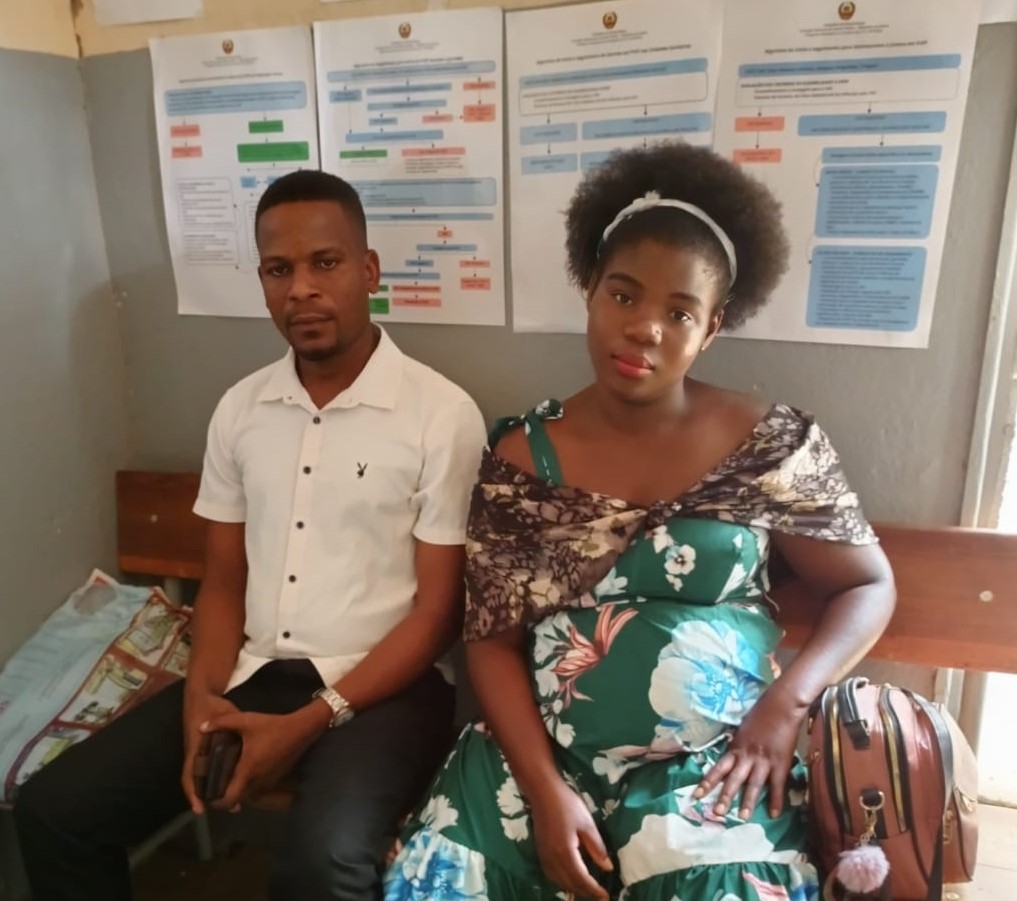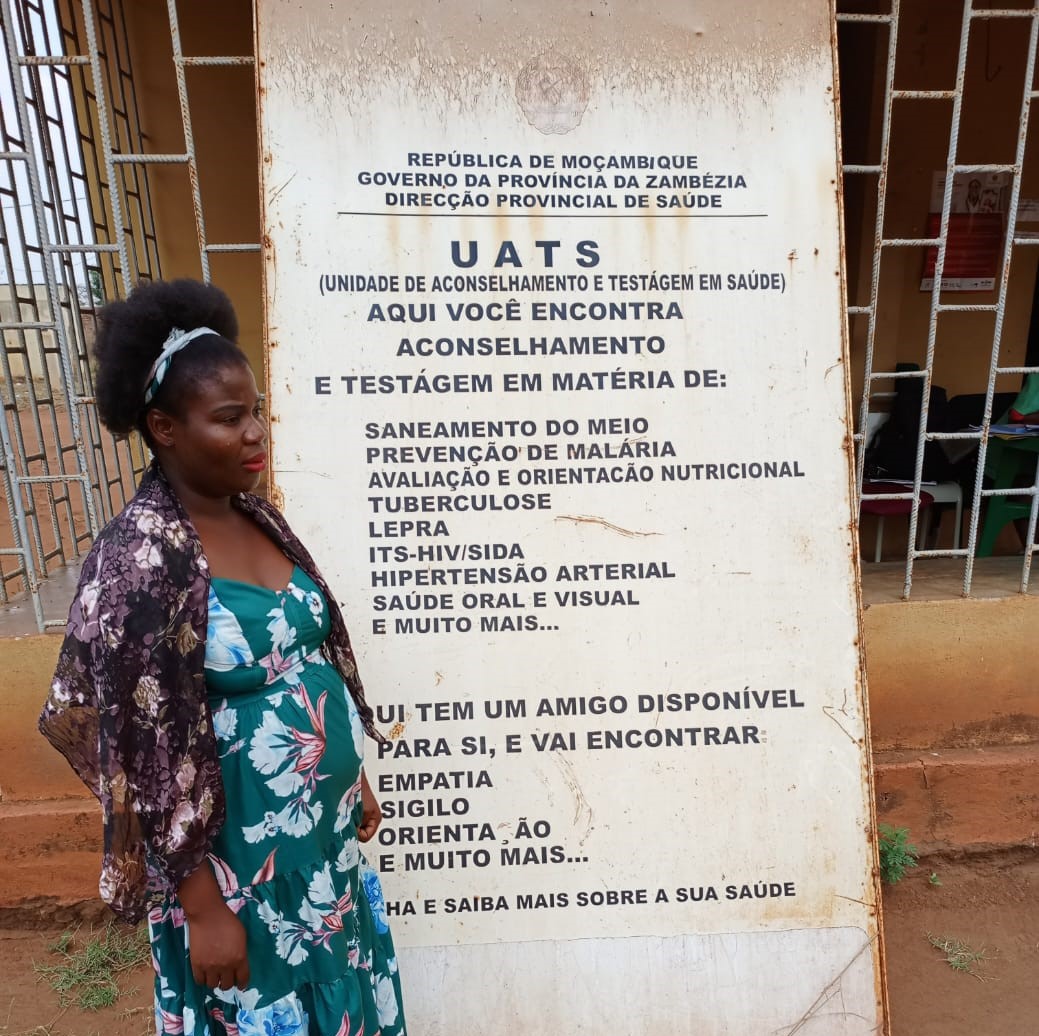“PrEP helped me envision a brighter future for my son. Without hesitating, I made the choice to embrace it. I will do whatever it takes to ensure my baby is born healthy,” Jolinda Davane, Morrumbala District, Zambézia Province.

Jolinda Davane, a vibrant 20-year-old woman living in the 25 de Setembro neighborhood in Morrumbala District, embarked on one of life’s most beautiful journeys – motherhood. She is nine months pregnant and had recently received the wonderful news that her HIV test result was negative.
Jolinda knew her husband, Chapo Ernesto Saiconde, has been living with HIV and that he was healthy with an undetectable viral load. Still, when she learned she was pregnant, anxiety and insomnia consumed her. The fear of potentially transmitting HIV to her baby tormented her every day.
Amidst the uncertainties, Jolinda and Chapo decided to take action. One Tuesday morning, they visited the Morrumbala District Hospital for their first prenatal appointment. While Jolinda met with the healthcare provider, her husband waited patiently in the courtyard. During the appointment, the nurse invited Chapo into the room and offered both of them an HIV test.
Jolinda's face lit up when she received the news that her test was negative. “I accepted the test and I jumped with happiness when I was informed that my HIV test result was negative. My husband, who was already aware of his HIV-positive status, shared this information with the nurse. He has been living with HIV since he was born.”
What followed was a life-changing moment for Jolinda. The nurse introduced her to a medication that could reduce the risk of HIV transmission to both her and her baby. With overwhelming relief, she embraced the opportunity to start pre-exposure prophylaxis (PrEP).
“The nurse explained to me how to take the medication and that I could take it to reduce the risk of getting HIV, and also protect the baby from the virus. This information took all the anxiety away and I did not hesitate to accept taking PrEP.”
Leaving that appointment, Jolinda’s heart was filled with dreams of a healthy future for her child. She exclaimed, “Since that day, everything has changed for me. Now, I eagerly anticipate the birth of my first child.”
Chapo became Jolinda’s unwavering supporter, ensuring she never missed a dose of PrEP. He knew that this decision was critical for their child’s health, and together they forged ahead with unwavering determination.
“When my wife was advised to start PrEP, I supported the decision because I knew that the chances of our child being born healthy had increased. I take my HIV pills every day at the same time with my wife, and so it is very easy to remind each other. The fact that I was born with HIV does not mean that my child must also be born with it. This is the information I hear in all of our appointments at the health facility.”

According to nurse Joana Almeida, “After receiving the pregnant woman [at the appointment], we always advise her to take an HIV test and we explain the risks of not taking the test. If the test is positive, the woman is advised to start ART following the Ministry of Health “Test & Start” strategy. When the woman initiates ART, the possible adverse effects of the medication are explained. The important thing is to stop the replication of the virus in the body. For women who come without a partner and test positive, we invite the participation of the partner. If the couple is positive after testing, we advise the couple to start taking ARV medications. The partner is transferred to ART services and the woman continues receiving assistance until the ninth month. We follow the pregnant woman so that the delivery takes place at the health facility, reducing the risk of vertical transmission of the virus to the baby.
Now, with PrEP, we also protect the babies of HIV-negative pregnant women, whose partners live with HIV, or are at high risk. They receive PrEP during pregnancy, delivery, and lactation.”
Jolinda Davane is one of 2,280 pregnant women who have benefited from PrEP during the fourth quarter of COP22 in Zambézia Province. This powerful strategy has given women hope and protection against HIV vertical transmission. With funding from the U.S. President’s Emergency Plan for AIDS Relief (PEPFAR) through CDC, VUMC/FGH supports the Zambézia Province Health Authorities in the provision of HIV services at 149 health facilities, 97 of which offer PrEP services.